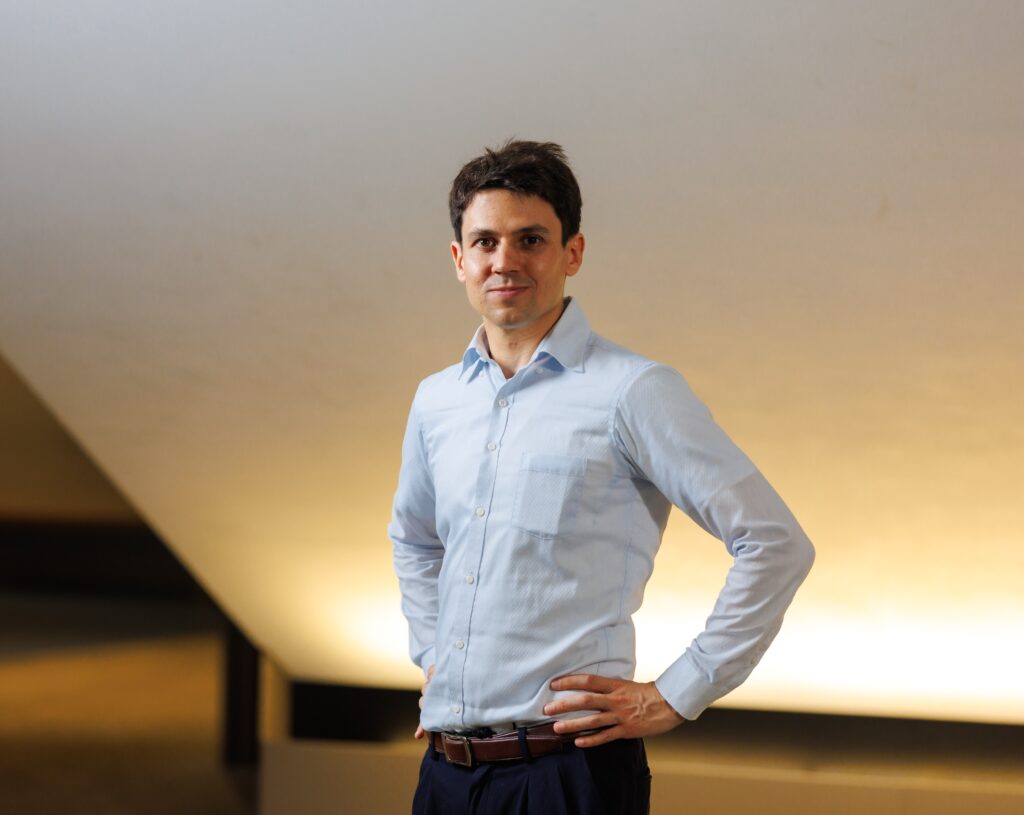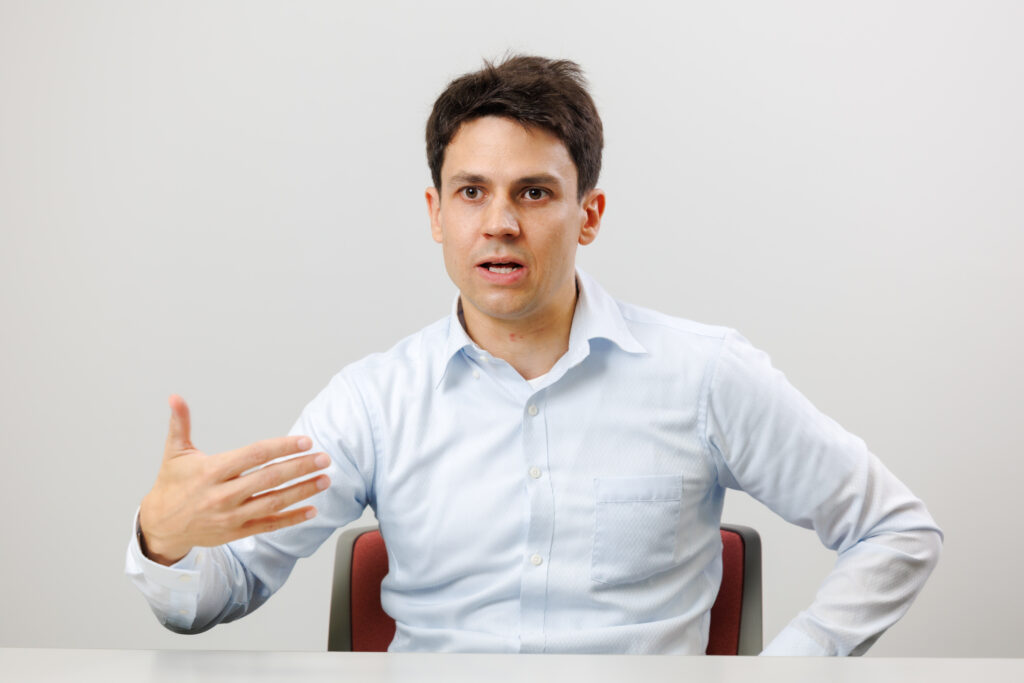
Associate Professor Tobias Weiss of the Faculty of Global Studies unveils an intricate landscape of journalism in Japan. His work focuses on the intersection of journalism, social movements and politics. He aims to illuminate the interplay and relationships among the media, civil society, and political and economic powers in reporting nuclear power and other issues.
As a sociology professor, one of my primary research topics focuses on journalism in Japan— specifically newspaper coverage about nuclear power. Contrasting news coverage in Japan and Germany following the Great East Japan Earthquake in 2011 is what triggered my curiosity about this subject.
By looking into the archives of major Japanese newspapers beginning in the 1970s, I was intrigued by the international differences in the portrayal and perception of nuclear power, which continue to drive different nuclear power policies. I aimed to provide an insightful portrayal of Japan’s journalistic landscape and to dissect the driving factors that influenced nuclear power reporting.
Intricate relationships among media, political and economic powers surrounding nuclear power reporting

One of the key questions is the autonomy of journalism from political and economic influences. Through an analysis of newspaper articles and interviews with journalists, I explored the dynamics of political and economic power in different contexts.
My research on nuclear power reporting shows that, particularly, prior to 2011, significant effort to exert political and economic influence on the media was evident in pro-nuclear campaigns supported by the electric utilities. Some journalists took part in government-led advisory councils known as Shingikai while others received financial incentives to promote favorable coverage of nuclear power.
Influence was exerted at the top management level from energy companies to newspapers aiming to silence critical reporting. Some media corporations organized nuclear power symposiums with journalists serving as moderators and speakers, blurring the lines between reporting and advertisement. Additionally, tie-up articles sponsored by electric utilities frequently featured pro-nuclear depictions, indicating a significant level of corporate influence on media content. This campaign was the main reason why the belief that nuclear power in Japan was safe and a severe accident would not occur became so widespread before 2011.
Nonetheless, it is important to note that certain limitations to political and economic influence exist, and some level of autonomy is evident within the media. The extent of external pressure was contingent upon multiple factors, including the professional ethic of single journalists, the organizational culture of different media companies and the separation between management and the editorial process. Analyzed from a sociological perspective, the different degrees of autonomy between different media companies in the field of journalism are not distributed randomly. During my interviews, for example, I encountered more progressive journalists who saw their professional role as being critical and independent towards political authorities and business interests. These professional role models supporting journalistic autonomy can be found much more often in the media companies more strongly oriented towards recognition within the field of journalism as opposed to media companies which mainly strive for economic profit or political allies.
One of my upcoming research projects focuses on journalism awards in Japan. I intend to explore awards presented by organizations such as the Japan Newspaper Publishers and Editors Association and the Japan Congress of Journalists to recognize exceptional reporting. Sorting out the different principles according to which these awards recognize journalistic work can help understand the structure of the journalistic field in Japan.
Exploring the role of civil society and social movements
Another crucial aspect of my research is the role of civil society and social movements in Japan. Civil society is considered important, enabling and supporting democracy. It is usually imagined in opposition to the state. However, there are many different groups and organizations in civil society. I believe to understand how civil society works, we have to arrive at an understanding of the overall interplay of forces shaping it.
For my next major project, I want to look at civil society groups which have a close relation to the state and are utilized by the state to achieve political objectives. I am particularly interested in how more autonomous social movements interact with these state-led civil society groups.
Pursuing research grounded in Bourdieu’s field theory
The foundation for my research is a sociological approach known as field theory. French sociologist Pierre Bourdieu introduced the concept of fields, which are distinct spaces in society where participants share common values or interests and are endowed with specific forms of capital. Examples of fields are economic, political, and cultural domains, while some examples of forms of capital are social capital, which pertains to networks among individuals, and cultural capital, as represented by education.
In part of my former research, I analyzed the field of journalism, examining the conditions of exchange of different forms of capital and the struggles about attaching value to it. Symbolic capital in journalism assumes the form of specifically journalistic prestige, often exemplified by awards, but it holds value only within the field. So, I have explored the influences of social and economic capital on newspaper articles, journalists, and media organizations, highlighting the contradiction between journalistic prestige and economic and political power.
I believe that field theory holds the potential to enhance our understanding of society compared to many other social theories, offering more insightful explanations that take the complex reality of social practice into account. I aim to apply and develop it within the context of Japanese society as well as other societies.
The book I recommend
“Die Regeln der Kunst: Genese und Struktur des Literarischen Feldes”
by Pierre Bourdieu; German translation by Bernd Schwibs and Achim Russer, Suhrkamp

In this book, Bourdieu develops a sociological theory called field theory by examining the development of French art and literature in the 20th century. The concept is applicable to other fields such as journalism and medicine. I read this during my Ph.D. and have conducted research based on Bourdieu’s theoretical framework. I believe that it is a powerful tool that can help us understand contemporary societies.
-
Tobias Weiss
- Associate Professor
Department of Global Studies
Faculty of Global Studies
- Associate Professor
-
Tobias Weiss received his B.A. and M.A. in Japanese Studies from University of Hamburg in Germany and his Ph.D. from University of Zurich in Switzerland. Prior to joining Sophia University in 2022, he was assistant professor at Heidelberg University in Germany for two years.
- Department of Global Studies
Interviewed: September 2023